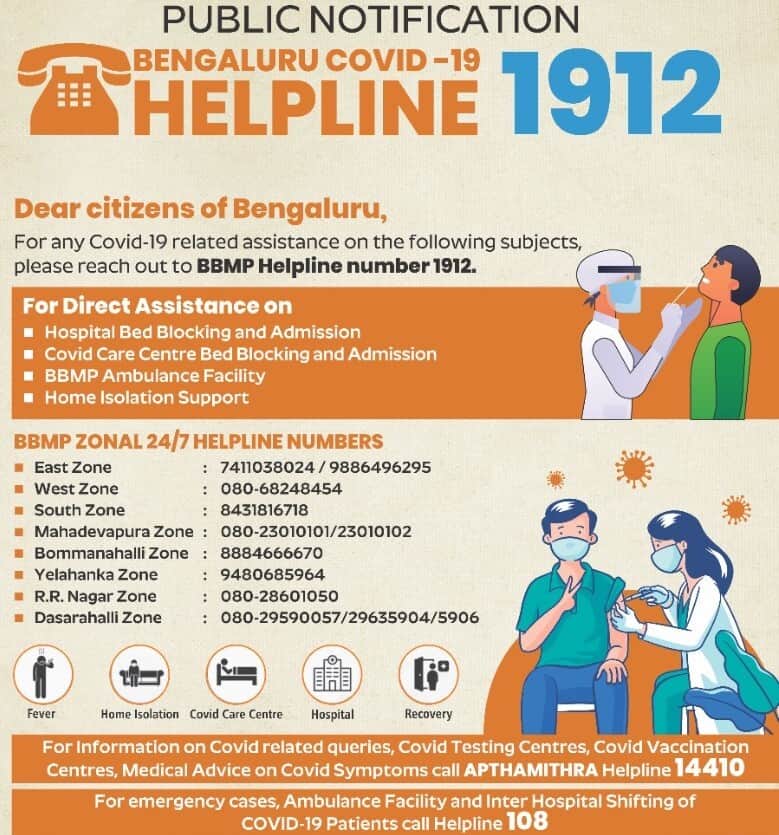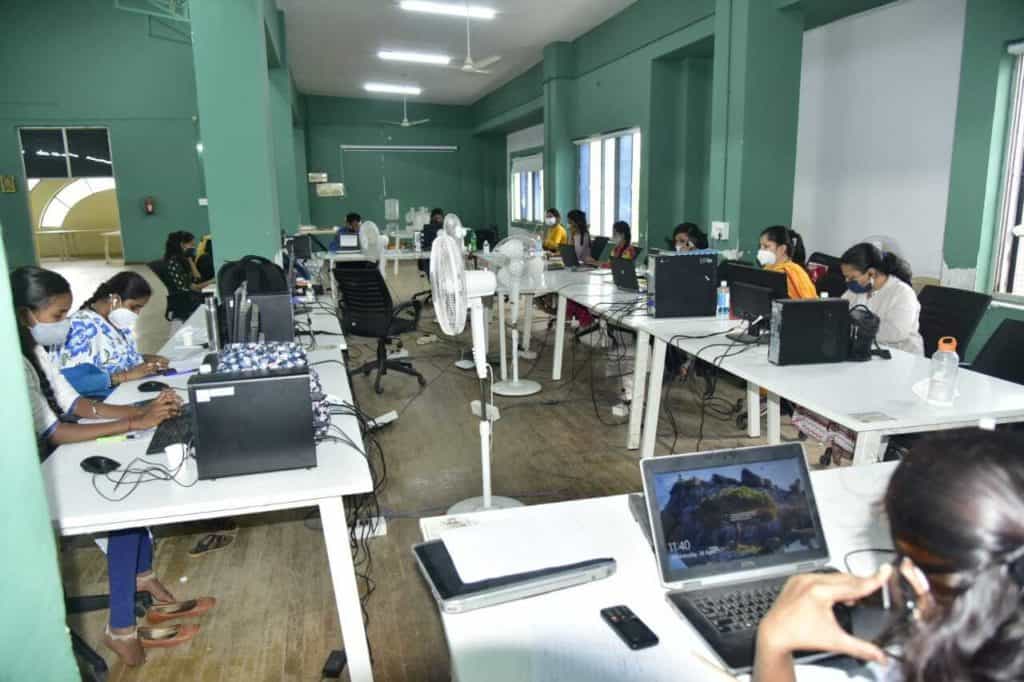Bengalureans have a multitude of COVID helplines, but how helpful are these? Those who have called the helplines for beds say it takes hours or even days to get a bed now. When it comes to follow-up for those in home isolation, some say they got calls on time, but some others say the calls came too late to be helpful.
“There are simply no beds”
Biju Mathews, a resident of Koramangala 3rd block, is part of a volunteer group that supports COVID patients. Last week, his group got requests for hospital beds from two critically-ill patients. Despite calling COVID helplines and private hospitals persistently, they got no help.
“Both patients had extremely low oxygen saturation levels. We tried for over a day to get beds for them; one of them had no BU number and the time taken to get it led to further delay,” says Biju “One person died before getting a bed. The other got the bed after one day, but died soon after admission.” From his experience, Biju says it takes a minimum of 12-24 hours to get a bed now, even though the majority of requests are from patients who need emergency care.
Any bed allocation for government quota beds (in both government and private hospitals) can happen only through the government’s COVID helplines. (Patients can also try calling private hospitals directly for private quota beds which are more expensive, but these are also scarce now.)
Read more: When and how to find a COVID bed in Bengaluru?
Sabeel Nazir, a COVID volunteer from the NGO Naasih Foundation, says even general beds are hard to come by now. “Since the last two weeks, there have been a severe shortage of beds. Earlier, when we called the helplines, it took only a few minutes – or at the most 15-30 minutes – to get a bed. Now we keep calling for hours and days, and still don’t get beds. The system is overwhelmed,” he says, adding that Bengaluru patients have travelled as far as Mysuru, Mangalore and even Kerala because getting a bed there would be easier despite the travel time.
Shivakumar, Health Officer at BBMP South zone, admits there are no ICU, HDU or ventilator beds now for the zonal helpline to allot. “Even general beds are few in number. South zone helpline gets 6000-7000 calls a day (for all purposes including beds),” he says.
How the helpline system works
There are multiple helplines for COVID patients:
- Central helpline (1912): Given the multitude of helplines, operators here identify the caller’s requirement and connect them to the relevant helpline.
- Zonal helplines (each with different numbers): Handles calls on various aspects like bed allotment, home isolation, tele-consultation requests, etc
- 108: Allots ambulance and ICU/ventilator beds in emergencies for critically ill patients. This is because 108 has ambulances equipped with oxygen supply and even ventilators, whereas BBMP ambulances only offer basic life support.
- Apthamitra (14410): For citizens to call if they experience symptoms, for triage, giving information on testing and vaccination centres, etc
- 104: State Health Department’s pre-existing helpline that handles general queries on COVID

Central helpline
The central helpline 1912 is set up by BESCOM, and operates out of BESCOM’s corporate office in KR Circle. Here, operators hired through a contract agency handle calls over three shifts everyday. Sixty operators – who have been trained by BBMP and state health officials – attend each shift, and their numbers are going to be increased, says Navaneeth, Technical Assistant to the MD at BESCOM.
Navaneeth says, “On getting a call, the operator will ask basic questions and identify the patient’s needs, and enter this information in a spreadsheet that the other helplines can also access. The operator will then connect the caller to the relevant helpline. For example, requests for general beds are passed on to the zonal helplines, whereas bed requests for emergency cases is passed on to 108.” The helpline also has 2-3 doctors, who do triaging for critical cases when required, and decide what kind of support the patient needs. However, Naveen too says ICU/ventilator beds are scarce, and only general beds are available now.
Representatives from BBMP, state health department, 108 and SAST (state government’s Suvarna Arogya Suraksha Trust that has set up the centralised bed management system) are also present at the central helpline. Navaneeth says that 90% calls to 1912 are incoming calls; the operators make outbound calls mostly for follow-up only (for example, to check if a patient did get a bed).
Zonal helplines
The zonal war room comes into the picture soon after a patient tests positive. Once the test results come, the BBMP central war room allots the patient a BU number. Then the zonal war room takes over. An ‘index team’ there calls the patient to verify their address and ensure they belong to the same zone, says Dr Pallavi Sridhar, who works out of the Bommanahalli zone war room.
“In our zone, the index team has four members who work in the morning shift. Under the index team are many other teams, like those for home isolation, contact tracing, hospital admission, etc. They get patient information from the index team and passes it on to the local PHC which also has such teams, and these teams are the ones who do the field work,” says Dr Pallavi. For example, the local PHC personnel provide home isolation kits to patients who are not taking treatment from the private sector, and visit the patient for contact tracing and stamping.
Patients in home isolation are supposed to get follow-up calls from BBMP regularly. Shivakumar, the Health Officer at South zone, says the calls could be from Apthamitra, from the zonal officers or PHC-based officers, and hence there could be duplication of calls too.

The number of lines operated at the zonal helplines vary. For example, the Bommanahalli helpline has 15 lines whereas South zone has 30 lines. The operators get a range of queries. If the patient requests teleconsultation or direct home visit, the operator passes on the contact of a BBMP doctor.
If the patient requests beds, zonal helplines – as in the case of the central helpline – have a few doctors who conduct triage. “Depending on the doctor’s decision, the bed allocation team will then book a general/ICU/ventilator bed as required from the CHBMS (Central Hospital Bed Management System),” says Shivakumar. BBMP Health Officers say triaging is important since many patients request beds worrying they may not get one later if their health deteriorates, or because they don’t understand their health condition accurately.
Mixed experience for patients in home isolation
While the zonal and ward-level health officers are supposed to follow up with patients in home isolation, this doesn’t happen properly always. Bhanutej N, a Vijayanagar resident, underwent an RT-PCR test at the PHC (Primary Health Centre) in Saraswathi Nagar on April 8, but never got his results. As his symptoms turned severe, he started taking medicines based on a teleconsultation with his sister, a doctor. He took the test again at a private facility later, and got COVID-positive result on 16th. He got his first call from BBMP after another two days, on April 18th – that is, 10 days after he had tested at the PHC.
“The first person who called was very mechanical, she asked if I needed hospital admission and collected my doctor’s details. I got another call the next day, wherein I was asked the contact details of my neighbours. This was for contact tracing, but I had not come into contact with my neighbours at all. So I shared my actual primary contacts, but they never got any follow-up calls from BBMP. A third person called me after another two days, and told me I could call his number if I needed anything. There were no calls afterwards,” says Bhanutej “I could have died if I waited for BBMP instead of consulting my sister.”
Read more: What to do if you test positive for COVID in Bengaluru
Biju Mathews says his PHC test results were delayed by two days, but that he did get calls from BBMP. “I tested at a PHC on April 5th, but got my results on 7th only. A delay of two days is unpardonable because it would be life-threatening for patients who need a BU number.” Biju got two calls overall – one the day he tested positive, and the second, two days later.
Two other patients – Aishwarya Sudhir and Kadambari Rananavare – had tested at private labs and got their results on time. They are happy with the way BBMP followed up with them. Aishwarya, who lives alone, had suffered severe symptoms and tested positive in March end. “Two days later, I got a call from BBMP to confirm my address. The next day, a person came to my house, asked about my symptoms and handed me a doctor’s number in case of emergency; he also traced my contacts. I got BBMP calls for at least another week, every day, sometimes twice a day. They checked if I was doing fine, if I followed the rules of isolation, and also gave advice. I’m very grateful to BBMP,” says Aishwarya. Kadambari received three calls from BBMP, and she knows that at least one of the primary contacts she shared with BBMP did get follow-up calls.
As the number of COVID patients are rocketing, it is to be seen if BBMP can indeed follow up with them all and also augment bed capacity so that the helplines can actually help.
For the last couple of days, ever since the “blocking-beds-scam” was busted, the call centers have pretty much stopped working. Myself and some of my relatives and friends are working as volunteers to help out in booking beds for the patients. We haven’t been able to get through any of the call center numbers 1912, 108. Hope things are brought online soon.